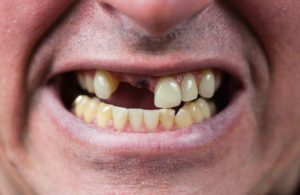
At some time, all of us have driven by an auto accident on the side of the road. A few may have been serious car or truck accidents where we suspected some of the people involved may have been injured. Many of these, however, are bump ups that may have caused auto damage but hopefully no harm to the drivers or passengers.
Although the difficulties involved with having to have an automobile replaced or repaired can be frustrating and time-consuming, when a facial injury is involved, it makes matters so much worse.
Although people have teeth ‘knocked out’ from all types of injuries, losing a tooth or teeth because of an auto accident seems all the more difficult. When a tooth is lost due to mishaps from a baseball game or bike accident, replacement tends to be less traumatic than when caused by an accident on the road.
In many accidents such as these, front teeth are primarily involved. Losing a tooth (or teeth) that is a ‘front & center’ part of your smile can be a blow to one’s appearance, self-confidence, and self-esteem. Replacing lost teeth should quickly become a priority for these reasons as well as for the health of your remaining teeth.
When a tooth is lost, neighboring teeth are affected. You see, each tooth is a place-holder of sorts, giving neighboring teeth support in maintaining proper positions. When an open area suddenly exists, the teeth on either side can lean inward into the empty space or tilt out of their positions.
The teeth above or below are also at risk for misalignment. For example, when an upper tooth is missing, the one below it — the one that ‘met’ it when the teeth were together — grows longer. This is because it no longer has its mate to keep it from elongating.
When teeth tilt, lean, or elongate, the result can lead to a higher risk of damage to surrounding teeth. This includes teeth that become chipped, broken, or fractured. When the fit of the bite is disrupted, it can also lead to night-time clenching and grinding. Bruxism, as the grinding motion is known, can result in worn teeth, and worse.
Bite misalignment can cause problems that involve the jaw joints, or TMJ. Typical problems associated with the TMJ are headaches, migraines, ear ringing, dizziness, jaw popping, sore jaw joints, difficulty opening the mouth fully, sore facial muscles, and even aching neck and shoulder muscles.
So, the need to replace missing teeth is clear, for many reasons. The decision of how you replace it may require more consideration. For many, the ideal replacement option is with a dental implant. As a dentist, I know how beneficial an implant can be for appearance and function. Yet, it is the benefit below the gums that provides a significant bonus which many are unaware.
Each tooth has roots. The roots are held in the jaw bone, providing support and stability for biting and chewing. When tooth roots are missing, the bone no longer receives stimulation or nourishment once provided by the tooth roots. The result is a shrinking of the bone, which is known as resorption.
When the bone mass declines, the tooth roots adjacent to the area of bone loss are at risk. Although a crown-&-bridge or partial can replace a missing tooth or teeth, they do not replace the presence of a tooth root. Dental implants are able to do this, halting the repercussions of bone loss.
The only obstacle for many people is cost. Although dental implants may seem more expensive than a crown and bridge combination, the investment is one that is designed to last your lifetime. With proper care, your dental implants should last as long as you do!
Another advantage is in how dental implants do not require the crowning of otherwise healthy teeth to serve as supports for replacement teeth. Because dental implants are held by the jaw bone, they do not need neighboring teeth for support.
If more than one tooth is lost in an accident or injury, one dental implant can often hold two or more replacement teeth. This helps to keep treatment fees lower since the cost for treatment is largely based on the number of implants placed.
The best time to place an implant? As soon as possible! When replacing a newly lost tooth, we may be able to insert the implant into the existing socket. This minimizes the placement procedure so healing time is much less. Additionally, rapid replacement also allows us to better preserve the natural contours of the gum tissues. This can eliminate the need for reshaping the gums later to restore the natural arch and ‘dips’ of gum tissues that frame each tooth.
When it comes to replacing teeth, remember – the need to do so is clear. How you do so is up to you and we support our patients in whichever method they choose. In all procedures, we make comfort a high priority, offering oral or I.V. sedation for added relaxation when desired. As a neuromuscular dentist, we also incorporate measures to help provide optimal bite alignment. This helps you to avoid issues associated with TMJ disorders or problems due to bite misalignment.
While accidents happen on the road, let’s hope your smile is never involved. If it is, we are here to restore your smile AND your oral health to a positive state. And, regardless of how you have lost teeth, we want to make replacing them a pleasant and successful process.
Begin with a free consultation. During this time, we can discuss all your options to replace missing teeth. I’ll answer your questions thoroughly and discuss comfort options. We can also have our Financial Coordinator discuss estimated fees as well as easy payment plans. Call 586-739-2155. Or, tap here to get started.